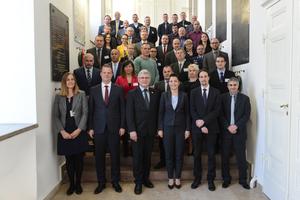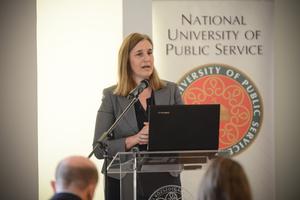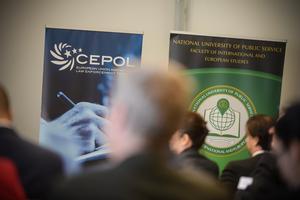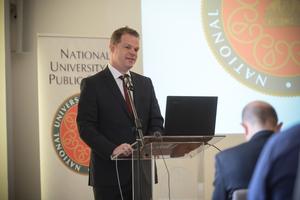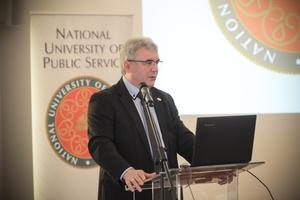„Challenges of European Cyber Security” was the title of a conference held at the National University of Public Service by the European Union Agency for Law Enforcement Training (CEPOL), in cooperation with the Faculty of International and European Studies of NUPS and the European Security and Defence College (ESDC). The main topics of the event were cyber security and cyber defence. The overall aim of the course is to enable participants to recognise the extensive nature of the information society we are living in and to recognise its complexity, inlucding the different threats we are experiencing. For this reason, the presenters defined the basic terms and concepts related to cyber security and cyber defence. They also introduced the European institutions and agencies involved in cyber security and in cyber defence, emphasizing their respective roles.
Dr. András Koltay, rector of NUPS highlighted in his opening speech the importance and the relevance of this matter. He further underlined that the National University of Public Service is in a leading position among Hungarian universities in the field of cyber defence. “The international experiences of the last couple of decades have taught us two important lessons: first, security is multidimensional. The challenges we face may be divided into various categories in theory, but in the real world, they usually occur at once and intertwined with one-another, resulting in complex situations” Accordingly, NUPS has a wide portfolio, ranging from public administration, to military science, to law enforcement, to international studies and to water sciences. All of these fields are considered as key focus areas of the university. “Second lesson: security is diverse. While we constantly focus on the development of our ability to be prepared for new things, the real world may often surprise us with challenges that are even newer, or with issues that are not new at all yet emerge unexpectedly.” The rector further talked about the importance of the cooperation between NUPS and CEPOL, and accentuated how significant the continuous development of cyber security and its education are. “Knowledge is power” - concluded the rector his speech.
According to Detlef Schröder we are facing many challenges these days. The Executive Director of CEPOL added that such challenges include for instance the economic and financial crisis, Brexit, the Islamic State and the situation of Ukraine and Africa. The goal of the member states and of the European Union is therefore to be more responsive to these challenges. “Cyber terrorism is a threat in many areas. One example to this was the United States Presidential Election of 2016” - said Detlef Schröder. The executive director thinks that the states need to find a unified response to these challenges, hence cooperation is of great importance in our times. Cyber-crime is considered to be one of the major problems, as a good technological background is essential for searching and evaluating evidences. “The nature of the topic is always international because the member states alone cannot handle the threats” - said the Executive Director.
Following his speech, Anna Molnár presented the organization, operation and general objectives of the European Security Defence College (ESDC). The Head of the Department of International Security Studies at the Faculty of International and European Studies said that it is an extended network with the aim of mediating on a strategic level between the national public servants, the military personnel of the EU and the civil crisis management staff. „The ESDC provides trainings and education in the area of common foreign and security policy” – summarized the head of department. Today the network has already 132 partners as well as 5 institutions from non-member states. Regarding its history: Since its establishment in 2005, the network has achieved a new training record during the 2017/2018 academic year. Overall 5044 soldiers and civilians participated in 114 different courses. The Military Erasmus programme gave the opportunity to 1303 cadets to cooperate in 67 different activities. Approximately 3100 interns have completed the e-learning course. The ESDC is organised in a four-tier structure: the Head of the ESDC is responsible for the financial and administrative management; the ESDC Secretariat is responsible for supporting the Head of the ESDC in fulfilling his tasks; the Steering Committee is responsible for ESDC training activities and last but not least the Executive Academic Board is responsible for ensuring the quality and coherence of ESDC training activities. In her closing remark, Anna Molnar emphasized the cooperation between ESDC and NUPS.
The event then continued with three panel discussions where participants talked about various topics, including cyber crime, the EU Cyber Strategy and the World Summit on Information Society.
